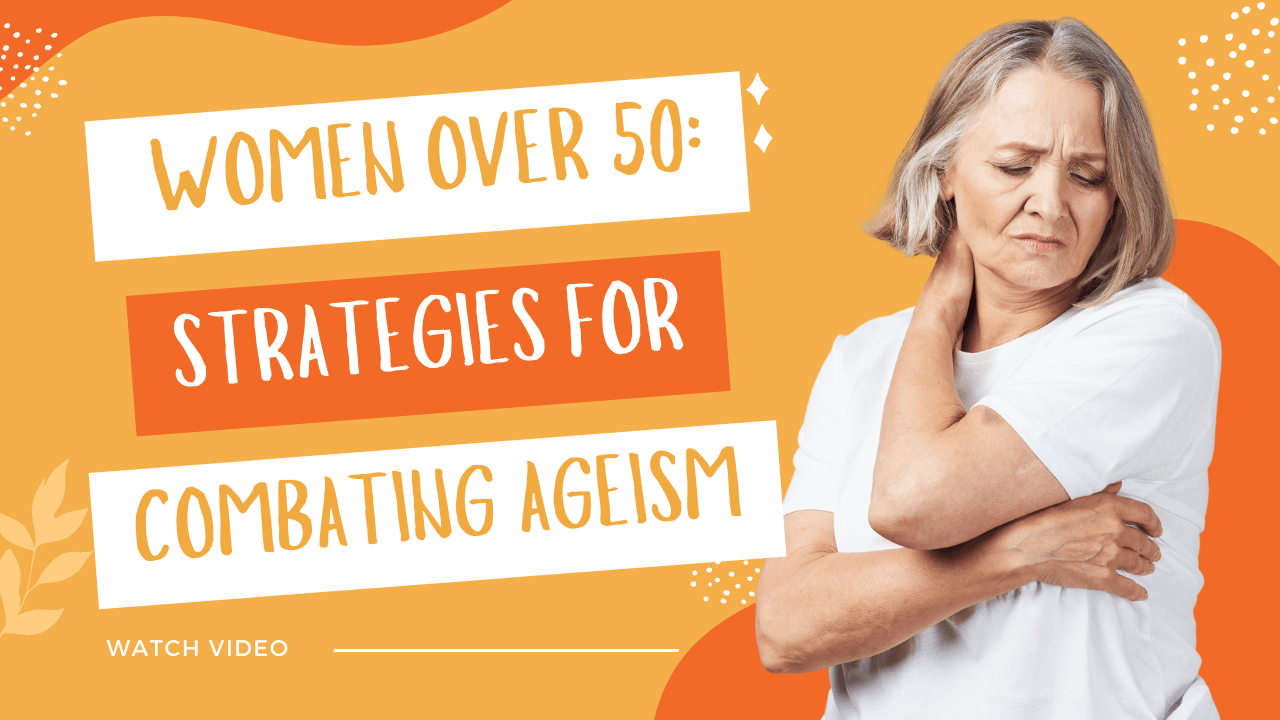When I was in my 30s and 40s, I never imagined I would one day be writing about ageism. When we’re young we don’t really think about this issue because we’re not experiencing it. It’s only when it finally impacts us or someone we love that we become more than casually aware, invested, and determined not to accept it.
Ageism against women is a significant problem in many societies around the world. Studies have shown that older women often face discrimination and negative stereotypes in the workplace, and may be passed over for promotions or job opportunities in favor of younger workers. Older women may also face discrimination in other areas of life, such as healthcare and social services.
The problem is compounded by the fact that women tend to live longer than men on average, so we may experience ageism for a longer period of time. It is important for society to recognize and address ageism in all its forms, including against women, in order to create a more equitable and inclusive society. It affects our bottom line and that has a detrimental ripple effect across our communities and broader society. This means it’s in everyone’s best interest that like all discriminatory -isms, we rid society of it.
Examples of Ageism
Some more examples of ageism that women over 50 may experience in the United States include:
- Being paid less than younger workers for the same job.
- Being forced to retire at a certain age, even if we are still capable of working.
- Facing negative stereotypes about our abilities and value as workers because of our age (such as being perceived as less competent or adaptable).
- Being excluded from social or professional networks because of our age.
- Having difficulty finding new employment after being laid off or terminated from a job due to our age.
- Being treated disrespectfully or dismissively because of our age.
- Being subjected to ageist jokes or comments from colleagues or others.
- Facing discrimination in the hiring process due to our age.
- Being overlooked or underrepresented in media and advertising.
- Facing discrimination in housing, such as being denied a lease or facing higher rent because of our age.
It is important to note that these are just a few examples and that ageism against women can take many other forms as well.
Strategies for Fellow Women Over 50
So what can we do? While we won’t be able to completely eliminate the problem, there are strategies for coping and confronting it. They are:
- Educate ourselves about ageism and its impacts on women. This can help us recognize and challenge ageist attitudes and behaviors.
- Use positive language when talking about our age and the age of others. For example, instead of saying “I’m getting old,” say “I’m getting wiser.”
- Don’t apologize for our age or try to downplay it. Own our age and the experience and knowledge that come with it.
- Network with other women over 50 and seek out mentors who can support and advocate for us.
- Stay current with events and trends in our fields to demonstrate our continued relevance and expertise. Keep our skills and knowledge up-to-date by taking courses, and attending conferences and workshops. Consider taking on new challenges or learning new skills to show that we are still capable and eager to grow.
- Don’t let ageist comments or actions go unchallenged. If we feel comfortable doing so, speak up and let the person know that their comment or behavior is not acceptable.
- Seek out organizations and companies that are supportive of diversity and inclusion, including age diversity. Ensure those companies have bias detectors built into the software that they use to administer their performance review and related processes.
- Practice self-care. Make sure to prioritize our own well-being and take care of ourselves, both physically and emotionally. Seek support if we need it.
- Don’t let ageist stereotypes dictate how we present ourselves. Wear what makes us feel confident and comfortable and embrace letting our hair go gray, for example, rather than trying to disguise our age or conform to certain expectations based on our age.
- Avoid using age as an excuse for not trying something new or taking on a challenge.
- Use social media and other online platforms to showcase our skills and accomplishments and to connect with others in our fields.
- Be open to feedback and constructive criticism, and use it as an opportunity to learn and grow.
- Don’t be afraid to negotiate for what we want, whether it’s a raise, a promotion, or better working conditions.
- Seek out supportive allies and advocates (not only those over the age of 50) who can help us navigate ageist attitudes and behaviors.
- Don’t let ageist attitudes or behaviors hold us back from pursuing our passions and goals. Don’t let ageism define us or limit our potential. Believe in ourselves and our abilities.
- Consider becoming an advocate for age diversity and inclusion in our workplaces or communities.
- Don’t let ageism limit our opportunities for advancement or leadership roles.
- Stay positive and focused on our strengths, experience, and accomplishments, and don’t let ageist attitudes or behaviors get us down. Don’t downplay our experience or achievements because of our age. Highlight the value we can bring to an organization based on our track record and skills.
- Don’t be afraid to seek out new opportunities, whether it’s a new job, a new hobby, or a new challenge.
- Consider starting a support group or network for women over 50 to share experiences and strategies for combating ageism.
- Seek out opportunities to share our knowledge and expertise with others, and don’t be afraid to speak up and share our thoughts and ideas.
- If we’re having trouble finding opportunities in our fields, consider starting our own businesses where we can be the boss and control our own destinies.
- Volunteer or take on pro bono work. Volunteering or taking on pro bono work can help us build skills and relationships, as well as demonstrate our commitment to our fields.
- Be open to changing industries or roles. Don’t be afraid to explore new opportunities, even if they’re outside our current industry or comfort zone.
- Use our voices to advocate for change. Participate in efforts to combat ageism and advocate for policies and practices that promote age diversity and inclusion.
- Consider sharing our skills and experience with others, whether through mentoring or volunteering our time to organizations that support career development.
- Practice gratitude. Focusing on the things we are grateful for can help shift our perspectives and improve our overall happiness.
- Practice self-acceptance. Don’t try to be someone we’re not – embrace our unique strengths and qualities.
Finally, younger women should take note. If you’re fortunate enough to find yourself over 50, you will be faced with the same issues. It would behoove many of you to be allies and supporters of your older female co-workers, friends, and family because one day, that will be you.
Also, visit ElevateWomenOver50.com for the companion video.
Update: Also view this article and video.
And:


